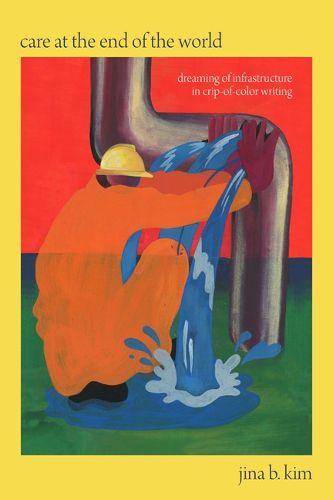Readings Newsletter
Become a Readings Member to make your shopping experience even easier.
Sign in or sign up for free!
You’re not far away from qualifying for FREE standard shipping within Australia
You’ve qualified for FREE standard shipping within Australia
The cart is loading…






In Care at the End of the World, Jina B. Kim develops what she calls crip-of-color critique, bringing a disability lens to bear on feminist- and queer-of-color literature in the aftermath of 1996 US welfare reform and the subsequent evisceration of social safety nets. She examines literature by contemporary feminist, queer, and disabled writers of color such as Jesmyn Ward, Octavia Butler, Karen Tei Yamashita, Samuel Delany, and Aurora Levins Morales, who each bring disability and dependency to the forefront of their literary freedom dreaming. Kim shows that in their writing, liberation does not take the shape of the unfettered individual or hinge on achieving independence. Instead, liberation emerges by recuperating dependency, cultivating radical interdependency, and recognizing the numerous support systems upon which survival depends. At the same time, Kim demonstrates how theories and narratives of disability can intervene into state-authored myths of resource parasitism, such as the welfare queen. In so doing, she highlights the alternate structures of care these writers envision and their dreams of life organized around reciprocity and mutual support.
Duke University Press Scholars of Color First Book Award
$9.00 standard shipping within Australia
FREE standard shipping within Australia for orders over $100.00
Express & International shipping calculated at checkout
In Care at the End of the World, Jina B. Kim develops what she calls crip-of-color critique, bringing a disability lens to bear on feminist- and queer-of-color literature in the aftermath of 1996 US welfare reform and the subsequent evisceration of social safety nets. She examines literature by contemporary feminist, queer, and disabled writers of color such as Jesmyn Ward, Octavia Butler, Karen Tei Yamashita, Samuel Delany, and Aurora Levins Morales, who each bring disability and dependency to the forefront of their literary freedom dreaming. Kim shows that in their writing, liberation does not take the shape of the unfettered individual or hinge on achieving independence. Instead, liberation emerges by recuperating dependency, cultivating radical interdependency, and recognizing the numerous support systems upon which survival depends. At the same time, Kim demonstrates how theories and narratives of disability can intervene into state-authored myths of resource parasitism, such as the welfare queen. In so doing, she highlights the alternate structures of care these writers envision and their dreams of life organized around reciprocity and mutual support.
Duke University Press Scholars of Color First Book Award